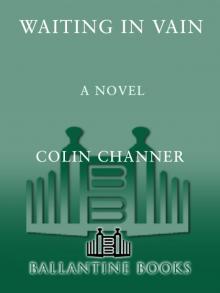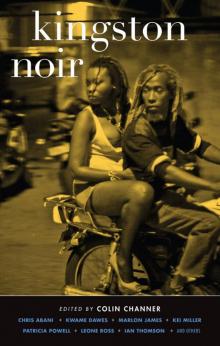- Home
- Colin Channer
The Girl With the Golden Shoes
The Girl With the Golden Shoes Read online
MORE PRAISE FOR COLIN CHANNER
“Channer has become one of the most significant literary figures in the Caribbean, influencing writers in the islands and those living and working abroad.”
—Globe and Mail (Canada)
For THE GIRL WITH THE GOLDEN SHOES
“Estrella is what her name implies/means. She lights up the pages of this extraordinary novella as she negotiates her youth and the characters who populate her island. The culture of class. The culture of love. The culture of race. The culture of gender. All conspire to change her—and they do, and they do, somewhat—but she impacts them also as she continues her trek toward her own resurrection. And what a resurrection she is!”
—Sonia Sanchez, author of Shake Loose My Skin
“A wonderful, deceptively simple island odyssey evoking the will to survive, overcome, and succeed. A haunting book.”
—M.G. Vassanji, author of The Book of Secrets
“Colin Channer is a graceful, natural storyteller with a keen eye and sharp ear. He effortlessly evokes the sense of a place and a people in strong yet subtle strokes. And Estrella is a magnificent heroine, a woman for her time. This is a captivating tale.”
—Diana Abu-Jaber, author of Crescent
“The Girl with the Golden Shoes is lyrical, moving, beautifully constructed, and morally complex. In this novella, Colin Channer continues to expand the possibility of the Caribbean narrative and push the limits of his own oeuvre.”
—Chris Abani, author of The Virgin of Flames
“Estrella Thompson is robust, durable, and sparkling on Colin Channer’s page—a girl trying to invent herself beyond her body…She invents herself in paper, in reading, in radio, in the modern. Channer’s literary prose is muscular and fluid, surreal and fabulous.”
—Dionne Brand, author of What We All Long For
“Just start reading, and see if you can stop. Colin Channer’s prose is that hypnotic, vibrant, beautiful, startling, more alive than life itself.”
—Francisco Goldman, author of The Divine Husband
“The Girl with the Golden Shoes is literary magic of the best kind. Each new character, each new sentence is deceptively simple, imbued with the same astonishing possibility as the best folktale. A sharp and relevant look at class and race, this book is one of the best I’ve read this year.”
—Joe Meno, author of Office Girl and Hairstyles of the Damned
For WAITING IN VAIN
“The love story is interesting, but not the most compelling element of the novel: What is most intriguing is the assurance of the voice, the strength of characterization, and the clear redefinition of the Caribbean novel—in which the discourses of post-colonialism have been usurped by the creative assurance of reggae’s aesthetic—a quintessentially modern aesthetic that has finally found the kind of dialogue between popular music and art that we have not seen in a long time.”
—Washington Post Book World
“Colin Channer believes fiction should ‘provide a cinematic experience for the mind.’ Waiting in Vain is a vividly sophisticated story of love and deep desire set in lush Jamaica, London’s gritty Brixton, and frenetic New York.”
—Philadelphia Inquirer
“The hope and pain of loves lost and loves found are just some of the novel’s triumphs. This one just might become a best-seller.”
—Booklist
“Channer’s prose is infused with serious Caribbean lilt—the patois is perfectly rendered—and heavy, heavy love vibes. Waiting in Vain is what happens when a gifted writer decides to get romantic.”
—Time Out New York
“First novelist Channer reveals his characters’ idiosyncrasies in poetic description…The culture and backdrop are so finely scripted that readers will feel they are in Jamaica.”
—Library Journal
“Fire and Sylvia pursue and retreat from each other in convincingly soul-searching scenarios while Channer vividly describes urban New York, industrial Brixton, and rural Jamaica.”
—Publishers Weekly
“Channer is a writer endowed with a special gift of language; he possesses a painter’s eye…Like Jean Toomer, Channer knows how to tap the rhythm of the pastoral without becoming too somnolent; and unlike the traditional novels of the past, Waiting in Vain is a witty, contemporary book full of well-developed, believable characters.”
—Amsterdam News
“Caribbean in origin but global in vision, Colin Channer is Bob Marley with a pen instead of a Gibson guitar. In Waiting in Vain, we see an enviable and unusual achievement in the best writers—that delicate balance between poetic elegance, narrative momentum, and intellectual grace.”
—Kwame Dawes, award-winning author of Bob Marley: Lyrical Genius
For PASSING THROUGH
“Channer is a gifted storyteller. He marshals the weighty themes of love, sex, race, class, and progress into an epic and vibrant narrative.”
—Washington Post
“A splendid collection by one of the Caribbean Diaspora’s finest writers. These tales are masterful distillations that teem with humor, with passion, with hope. Channer’s compassion never fails to amaze.”
—Junot Díaz, author of Drown
“Colin Channer is a wonderfully funny, piercing, crafty, and compassionate writer, and Passing Through is a remarkable literary achievement. The stories bring with them the keen thrill of having discovered a truly fresh, original voice—Channer’s multiform vision of the Caribbean and the people who flow in and out of it is an exciting and even vital contribution to the world of the short story.”
—Dan Chaon, National Book Award finalist
“No one describes the wonders and aches of love as sensuously as Colin Channer, and Channer has no rival when it comes to capturing the rhythmic beauty of island patois on the page. In Passing Through, Channer’s silky prose is at its absolute finest; the stories are interwoven like a tapestry, a tapestry which scans across the panorama of Caribbean history to create an entirely new vocabulary of love, loss, and discovery.”
—ZZ Packer, PEN/Faulkner Award finalist
“Passing Through takes you to the islands, into the nitty-gritty of being an islander, and the taste of being in the Caribbean. And Colin Channer’s smooth Jamaican rhythm comes through his sentences. If you can’t take a trip, take this as a little taste.”
—Touré, author of The Promised Land
“Jumping into Passing Through, the third book by Jamaican-American author Colin Channer, is akin to visiting a foreign country and sampling its exotic cuisine and unique culture. It is an experience that teaches, entertains, and affirms the universality of our collective human experience. The communication of that shared experience, in all its perplexing, often disturbing beauty, is what Channer has clearly mastered here.”
—Virginian-Pilot
For IRON BALLOONS
“The story comes at you with hurricane force and an irresistible title, ‘How to Beat a Child the Right and Proper Way.’ It is the creation of the Jamaican writer Colin Channer, who is also the editor of Iron Balloons, an anthology of a new kind of Jamaican writing…‘The Right and Proper Way’ is a big breath of a piece, fifty-four pages long, and something of a tour de force, spoken in various registers of Jamaican English.”
—New York Times
“The pick of the collection is Channer’s own contribution. ‘How to Beat a Child the Right and Proper Way’ is a hilariously digressive monologue delivered by a Jamaican woman to a class of mature students in the United States…At first she seems to be an interfering tyrant; but her moving tale unravels to show a sympathetic, contradictory person.”
—Times Literary Supplement (UK
)
“The ability to eloquently delineate a particular experience—Caribbean life—accounts in large part for the significance and success of Iron Balloons…The anthology offers some of today’s most prominent Caribbean writers, including Kwame Dawes, Elizabeth Nunez, and Channer himself, as well as such newcomers as Marlon James and Sharon Leach.”
—Toronto Star (Canada)
“The stories share a focus on lushly drawn, believably human characters, while their settings and moods are pleasingly diverse.”
—Boston Herald
“Channer’s ‘How to Beat a Child the Right and Proper Way’ is a mesmerizing tale told in a sparkling vernacular.”
—Time Out Chicago
“Channer’s imagery is so vivid that the brutal whipping depicted in his story can almost be heard. But Channer allows the beater—a mother straddling the working- and middle-class worlds who is disciplining her rebellious teen daughter to save her from certain destruction—to gain sympathy as she considers class, skin color, and social standing in post-colonial Jamaica.”
—Philadelphia Inquirer
This is a work of fiction. All names, characters, places, and incidents are the product of the author’s imagination. Any resemblance to real events or persons, living or dead, is entirely coincidental.
Published by Akashic Books. By arrangement with Ballantine Books, an imprint of Random House Publishing Group. The Girl with the Golden Shoes was originally published in an earlier form as a section of Passing Through, stories by Colin Channer (One World/Ballantine).
©2004, 2007 Colin Channer
Afterword ©2007 Russell Banks
ISBN-13: 978-1-933354-26-2
ISBN-10: 1-933354-26-7
eisbn: 9781617752308
Library of Congress Control Number: 2006936536
All rights reserved
Second printing
Akashic Books
PO Box 1456
New York, NY 10009
[email protected]
www.akashicbooks.com
Also by Colin Channer
Waiting in Vain
I’m Still Waiting
(novella, in Got to Be Real)
Satisfy My Soul
Passing Through
(stories)
Iron Balloons: Hit Fiction from
Jamaica’s Calabash Writer’s Workshop
(editor)
So Much Things to Say
(poems, coeditor with Kwame Dawes)
Kingston Noir
(editor)
For Addis and Makonnen
Contents
Title Page
Copyright Page
Acknowledgments
Chapter I.
Chapter II.
Chapter III.
Chapter IV.
Chapter V.
Chapter VI.
Chapter VII.
Chapter VIII.
Chapter IX.
Chapter X.
Chapter XI.
Chapter XII.
Chapter XIII.
Afterword
Acknowledgments
Special thanks are due to my children, Addis and Makonnen, my junior editorial and production assistants; to my editor and bredrin Johnny Temple of Akashic Books, who is practiced in the art of leaving a writer alone and the science of knowing how to suggest editorial changes with care and respect; to my agent Marie Brown, who has guided my career since the publication of my very first book in 1998; and to Russell Banks, whose Book of Jamaica made me want to be a writer in ways I didn’t understand before I read it in 1982, and who fully understands the heirloom value of his afterword, yet still agreed to entrust a part of his legacy as a writer, thinker, literary activist, and teacher to a clumsy apprentice like me.
Special thanks are also due to the writing community that sustains me, especially the members of that community who graciously agreed to publicly acknowledge their regard for this work.
Warm appreciation goes out to Kwame Dawes and Justine Henzell, with whom I created the Calabash International Literary Festival Trust, and the thousands of people who come to the festival every year, for helping to create the platform that has given me the level of visibility required to get this kind of story published.
My colleagues in the English department of Medgar Evers College deserve a medal for taking the time to help me adjust to an academic schedule, and for being mindful of the many obligations of a fellow writer’s life.
I.
They were sitting on old buckets, scaling fish beneath an almond tree, when someone pointed to the water and they all began to shout.
They were hardy children who’d been raised in isolation on a crescent beach below a cliff, and had experienced many horrors—drownings, stabbings, births, and storms. But when they saw a one-eyed monster rising from the deep, they dropped their tools and dashed off in a blur of skirts and faded tunics to the clump of shacks in which they lived, raising clouds of sand as white as salt.
The eldest girl, Estrella Thompson, would be fifteen soon, and thought herself mature. She’d recently begun to read, which had created an awareness of a universe beyond San Carlos. So, unlike her friends, she was interested in the war.
The war was taking place in Europe, a place she’d only heard about the year before. Poland. Antwerp. Riga. Spain. The names were sparkling gems of sound that shimmered with a range of possibilities that went beyond the dreams of all her neighbors in the cove. So on the rare occasions that she’d had the chance to travel into town, she’d steal away to loiter in the little shops in Woodley, the district of the artisans adjacent to the port. There, she’d listen to the intonations of the BBC announcer on the redifusion box and be transported like a person who’d gone to see a medium for a glimpse of life across the void into the other world.
On these nights more than others, as she curled up in the hammock she shared with other girls beneath a shed beside her old grandmother’s hut, Estrella would gaze outside the window as she fingered old newspapers and her cache of stolen books, dreaming of the day when she’d be rescued from this place where nothing happened.
So while the others ran, she hid behind the almond tree and watched in fearful fascination as the creature loomed.
It wasn’t until the mask had been removed that Estrella, who’d never been to school or traveled much on her tiny island, understood that what she thought had been a monster was a human being—a scuba diver in a rubber suit.
She stepped out from behind the tree and walked toward him in her old blue frock with eyelet lace around the hem, hips moving widely underneath the faded fabric, giving insight to the marvel of her shape. She was tall and big-boned with mannish shoulders and a long face with sharp cheeks. Her eyes were bright and slanted, and although her skin was darker than a Coke, she had a length of wavy hair.
“What are you wearing?” she asked in English, which she rarely had the need to use, since everyone around her spoke Sancoche.
“It lets me breathe beneath the water.”
They talked for several minutes, during which he explained some of his duties; then he disappeared below the surf.
In Sancoche, her native dialect, Estrella kept repeating as the ripples disappeared, “I never even thought to dream of seeing a thing like that.”
II.
“You can go on with you stupidness.”
Two days had passed, and Tucker Ross had heard the story many times from many people, but most often from the girl, his granddaughter by the common law.
“Big Tuck,” she said, insistently, “is true.”
He fanned as if her words were buzzing insects.
“A man can’t breathe underwater no matter what he put on his body or his head, Estrella. I really think is a mermaid you see. It have different kinds, you know. And I heard it have some that look like man, in truth.”
They’d just completed dinner, and Estrella, who’d replayed her visitation many times, had told the story once again, with every detail in its
place—the fellow was a blue-eyed Yankee soldier, and he’d told her he was part of something called “man hoovers,” which meant he and some other men were practicing a thing they had to do. And the thing they had to practice was to stick a thing like dynamite on German boats below the waterline and blow them up.
The night was hot, and she was sitting on a woven mat beneath the hut in which she lived with Big Tuck and her grandmother, Roselyn—a dark, thick-featured woman with a golden tooth that twinkled when she talked.
Roselyn had arrived in San Carlos in the 1920s from Havana, but she wasn’t Cuban. She was a Trinidadian who’d gone to work in Cuba as a waistress in the early 1900s, brooding as she served her body to the Yankee soldiers stationed on the island to secure it in the nom de guerre of freedom—whose baptismal name is profit—after the Spanish-American War.
If she could, she would’ve returned to Trinidad; but word had traveled to her mother that she was a prostitute; and her mother, who for years had kept Roselyn’s children, sent a message that she’d bought a special cricket bat to beat them nasty ways out of her dirty, worthless daughter if she ever came to Trinidad again.
When Roselyn moved to San Carlos, she’d left a daughter behind, a daughter born in Havana…father unknown. Years later, when this daughter died in labor, Roselyn went to Cuba for her newborn child.
Almost dead at birth, that child, Estrella Thompson, grew up to be advanced beyond her years.
Like the other dwellings in the camp, the hut was roofed in thatch and set at shoulder height on wooden stilts. On the hottest evenings, Estrella and her family would eat below it on the shaded sand, which had been shielded from the heat.
“Is not stupidness,” she offered in the rumbling cadence of Sancoche. “It have a lot o’ things going on in this world we ain’t know ’bout up here down this coast. Even in town things going on. Is only we don’t know nothing. All we know is fish. Catch fish. Scale fish. Eat fish. Fry fish.”
Big Tuck sat with his belly pressing on his dark brown shirt. He was squat and hairy, with skin the orange-brown of rum; and his chest and arms were bulky still from rowing boats and pulling nets for almost all his eighty years.

 Waiting in Vain
Waiting in Vain Kingston Noir
Kingston Noir The Girl With the Golden Shoes
The Girl With the Golden Shoes